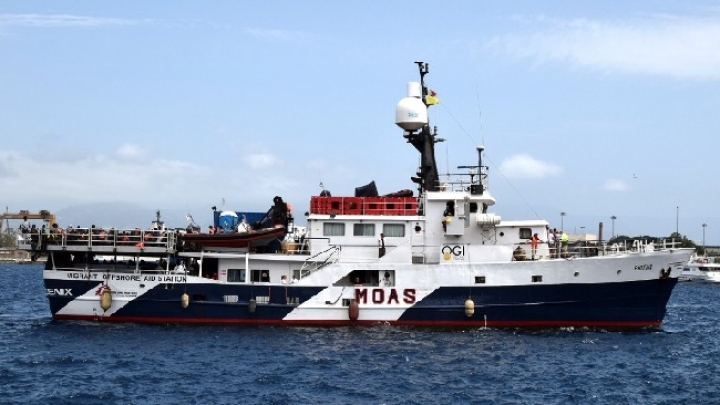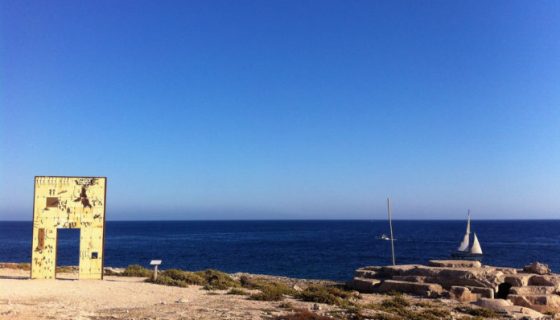- Mediterranean Hope - Federazione delle chiese evangeliche in Italia
- mh@fcei.it
MOAS, MSF and Sea Watch: Independent Search and Rescue Services Following the End of Mare Nostrum
by Paolo Cuttitta (Vrije Universiteit Amsterdam) – If 2014 went down in history as the era of Mare Nostrum – rescuing people at sea through government and military humanitarian interventions – on the other hand 2015 will be remembered for a number of non-governmental and civic initiatives. This summer, in fact, three different non-governmental actors are playing a very decisive role by searching for boats heading towards the Italian coasts: MOAS (Migrant Offshore Aid Station), operated by MSF (Medici Senza Frontiere, Doctors Without Borders) and Sea Watch.
First of all, we should not confuse these three subjects with so many other private actors who often end up contributing to rescue operations when, being close to boats in distress, are invited by the authorities to provide relief. In 2014, up to 30,000 people have been rescued by cargo ships or private vessels. In such cases, the involvement of private citizens is completely accidental. Cargo ships are structurally inadequate to carry out rescuing missions and their involvement in rescue operations led to fatal accidents more than once. The aforementioned actors, however, are non-state actors engaged in permanent search and rescue missions, using boats equipped for this activity. The first were Christopher and Regina Catrambone, a US-Italian couple living in Malta. On the wave of emotion following the Pope’s visit to Lampedusa and after the October 3rd 2013 disaster, they decided to use their money to arm a 40-meter ship, The Phoenix, equipped with everything needed in rescue operations (including two drones for the research phase, two fast inflatable boats and a field hospital for immediate care). The 2014 mission began in late August and ended in late October: 3,000 people were saved. After a break of six months, used to raise the necessary funds (money and equipment including the outstanding 180,000 Euro paid by the German magnate Jürgen Wagentrotz), MOAS started new rescuing missions in May 2015. In 2015, MOAS also started an important collaboration with MSF. MSF’s medical staff is now on board of The Phoenix. The ship, in two and a half months of work, has already rescued more than five thousand people. At the same time, MSF has decided to offer its own services, setting up two more ships. On May 9th the Bourbon Argos began its activities (with 26 crew members), and on June 13 the Dignity I (50-meter long boat with a 18-person crew) set sail. About 5,500 persons have already been rescued by the MSF boats. Sea Watch is the latest rescue project. As MOAS, it is an initiative promoted by private citizens (in this case German) who decided to invest their money, their time and their energy to save lives. Harald Höppner, wholesaler Berlin, is the main architect of the project. Once purchased with his own savings a 21-meter boat, Harald and his fellows started collecting, through private donations, the money needed by the project at least for a year. The crew consists of volunteers who take turns: eight at a time over weekly shifts. On June 20, Sea Watch, based in Lampedusa, sailed for its first expedition, during which it only supported other vessels, contributing to the rescue of a thousand persons. In July, during its second intervention, Sea Watch carried out six rescue missions, saving 594 persons. From the operational point of view, there is an essential difference between MOAS, MSF’s ships and the Sea Watch. The first are real ships, able to board hundreds of people at a time. Typically, they are routed by the Italian authorities – or at least in accordance with them – to where there are boats in distress (mostly identified following the SOS launched with satellite phones by passengers). Once the rescuing operation is over, immigrants board an Italian or a Frontex military vessel or they are taken to a port indicated by the authorities. The Bourbon Argos sailed three days (from July 15th to 18th) around Sicily before the authorities told the crew where to take the almost 700 people on board due to the lack of space inside the inland reception centres. This event highlights the difficulties faced by independent search and rescue missions. However, at the same time it confirms that – excluding police and intelligence tasks – MOAS and MSF carry similar operations to those undertaken by Frontex and by the Italian authorities. The activity of the Sea Watch is different. This ship is too small to safely accommodate more persons than the crew members. For this reason, the Sea Watch, once it reaches a boat in distress, waits for the arrival of other ships – whether of MOAS, MSF, Frontex, the Italian authorities or a cargo – where to board the passengers. Meanwhile the crew will only provide refreshments and medical assistance, and, if necessary, use the six lifeboats (each able to accommodate 65 people) attached to the Sea Watch to secure the survivors. Therefore the Sea Watch, unlike the other three independent ships, has never transported immigrants to inland centres, and it is always sailing (unless to go back to Lampedusa for a new shift or regular technical breaks). It keeps on patrolling the area close to the Libyan territorial waters. That is how, in the second week of July, the Sea Watch crew – the area was unguarded because of the simultaneous absence of all other vessels – has been able to identify four of the six boats it approached and 424 of the 594 people saved during its second mission. Captain Ingo Werth said: “Most of the boats we identified had no satellite phone and therefore could not call for help. These people can be saved only if there is an active searching process”. Harald Höppner takes this concept further: “If we had not been out there, who knows what would have happened.” In addition to the operational level, there are some differences between the three non-state actors in terms of communication. MOAS, for example, maintains neutrality. MOAS director Martin Xuereb said: “We have to keep politics separate from search and rescue operations Saving lives is on top of our agenda”. MSF lives up to its tradition of a humanitarian organization that has no qualms to question the causes of the emergency – it explicitly pushes for it – and to hold the political authorities responsible for it. Namely MSF calls for “a radical rethinking of migration policies” since the current ones “continue to push people to travel long and dangerous journeys in the hands of traffickers”. Harald Höppner from the Sea Watch has his own advice, so far the most explicit: “We should create regular means for those people to join the European Union: any other proposal will not solve the situation. As long as people will be forced to climb on the boats, the tragedies will happen. ” And, while welcoming the excellent cooperation with the Italian authorities, Höppner – given the fact that the Sea Watch operated at sea by itself more than once – raises a question: “Where are the Triton mission’s funding, tripled after April disaster? Where are their vessels?” Beyond every point of view, the absolute inadequacy of the European migration policies – which force people to risk their lives – is highlighted by these independent actors activities. The same is also true for the European rescuing system, supported by non-state volunteers and (as in the case of the Bourbon Argos) sometimes hampering their activities. It would be interesting to follow how the relationships between these entities will evolve (let’s not forget Watch the Med – Alarmphone, another NGO initiative, which provides a hotline for those crossing the sea, and ensures the adequate and prompt authorities intervention). It would be compelling to monitor how the increasing presence of independent operators in the Mediterranean will not only improve the search and rescue missions’ quality but it will also ensure that Italy and Europe come to that radical rethinking of their migration policies advocated by Höppner. In the meanwhile, the Sea Watch founder says: “As long as things do not change, we will stay here and continue, within the limits of our abilities, to save people.”





